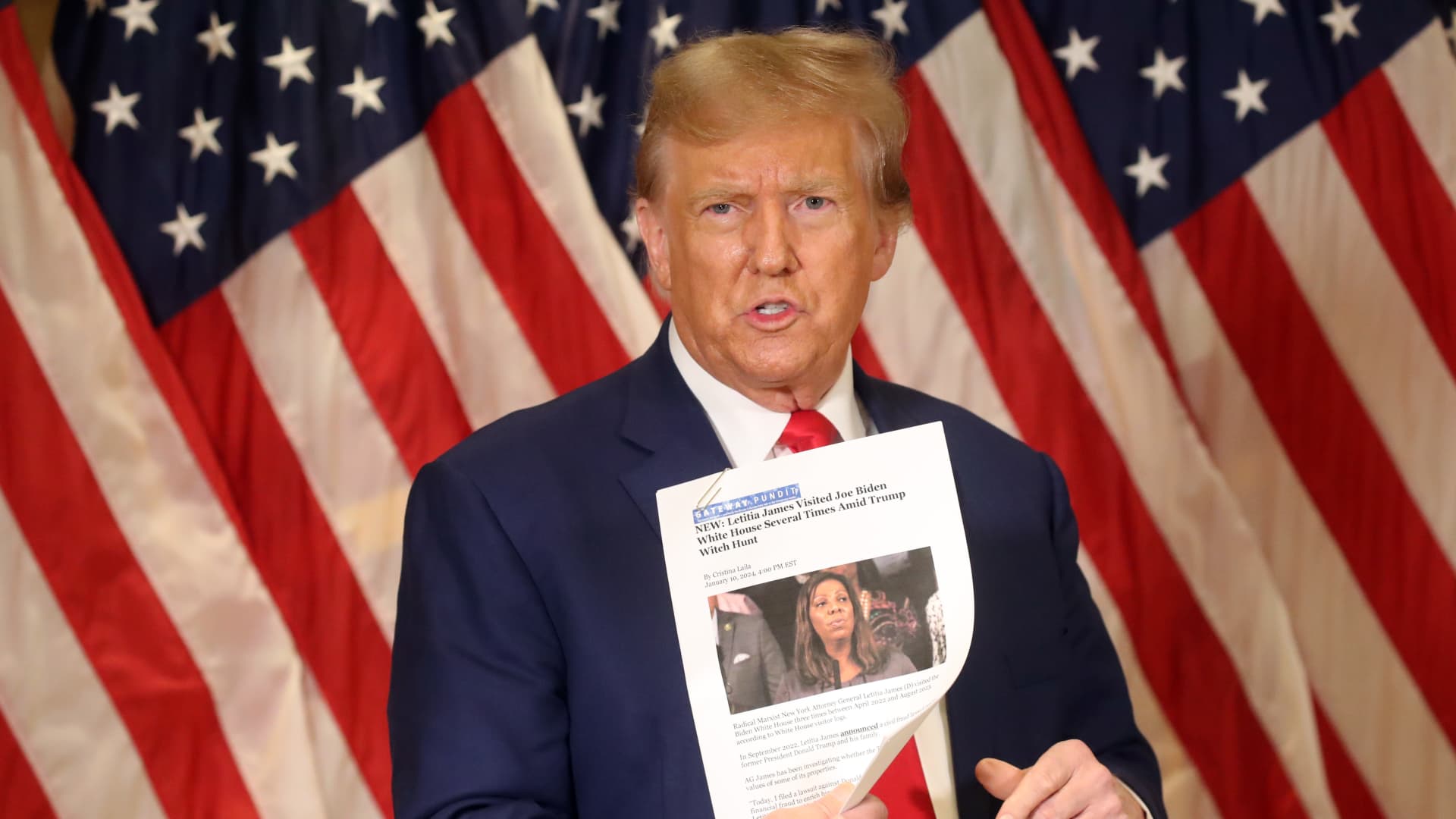Former President Donald Trump has been unable to obtain an appeal bond to secure a $454 million civil judgment against him in a New York business fraud case, his attorneys said in a court filing Monday.
Lawyers for Trump and his co-defendants said it has been “impossible” for them to secure a complete appeal bond, which would effectively require “cash reserves approaching $1 billion,” which neither the former president nor his company has.
Trump’s team has approached, without success, around 30 surety companies through four separate brokers as he seeks an appeal bond, and they have spent “countless hours negotiating with one of the largest insurance companies in the world,” according to the filing with the Appellate Division of Manhattan Supreme Court.
Under New York court rules, Trump must post an appeal bond if he wants to avoid New York Attorney General Letitia James moving to collect on the fraud judgment in the state’s favor.
James has said she will seize Trump’s property if he is unable to pay the entire judgment or obtain an appeal bond.
Trump’s lawyers in their filing said that if the appellate division considers denying a stay of the judgment, it should schedule oral arguments on the issue.
And the attorneys asked that if the division declines to grant the stay, they be allowed to ask the Court of Appeals, the highest state court in New York, to pause the judgment without Trump having to obtain an appeal bond in the full amount.
Manhattan Supreme Court Judge Arthur Engoron in February ordered Trump and his co-defendants to pay a total of $464 million in damages and interest for violating a New York anti-fraud statute.
Engoron ruled in favor of James, who in a lawsuit had accused Trump, his two adult sons, the Trump Organization, and the company’s top executives of falsely inflating Trump’s asset values for years to boost his net worth and get financial perks.
Trump was ordered to pay the lion’s share of the judgment: $454 million. Post-judgment interest on Trump’s share of the damages continues to accrue at a rate of nearly $112,000 a day.
Trump, who has secured the Republican presidential nomination, in a deposition last year claimed to have “substantially in excess of $400 million in cash.”
Despite that, Monday’s nearly 5,000-page court filing by his lawyers detailed his inability to get a bond to secure the full judgment.
The filing includes an affidavit from Gary Giulietti, president of the Northeast division of the Lockton Companies, which he describes as the largest privately held insurance brokerage firm in the world.
Giulietti, who was hired to help the defendants to obtain a bond, in that statement wrote, “Despite scouring the market, we have been unsuccessful in our effort … for the simple reason that obtaining an appeal bond for $464 million is a practical impossibility under the circumstances presented.”
Only a handful of bond surety companies are approved by the Treasury Department to underwrite a bond that large, and many of those firms will only issue a single bond to a maximum of $100 million, Giulietti wrote.
He also said that none of those companies will accept non-liquid assets — such as real estate — as collateral.
“Simply put, a bond of this size is rarely, if ever, seen,” Giulietti wrote. “In the unusual circumstance that a bond of this size is issued, it is provided to the largest public companies in the world, not to individuals or privately held businesses.”
The Trump Organization is privately held.
Giulietti wrote that it would be unattainable for a private company to obtain a bond to secure the $464 million total judgment unless it had around $1 billion in cash or cash equivalents to offer as collateral, while still being able to satisfy its other business obligations.
“While it is my understanding that the Trump Organization is in a strong liquidity position, it does not have $1 billion in cash or cash equivalents,” he wrote.
Trump’s attorneys also noted in the filing that bond issuers often will demand collateral totaling 120% of the judgment, which equates to over $557 million.
Those issuers are also likely to demand a two-year advance on a 2% annual bond premium, which would require the defendants to pay more than $18 million upfront, the lawyers wrote.
The defendants had previously offered to post a $100 million bond to prevent James from collecting on the judgment while Trump appealed Engoron’s verdict.
An appellate division judge rejected that proposal but allowed the defendants to continue doing business in New York and lifted Engoron’s three-year ban on Trump seeking loans in New York. That order is temporarily in effect before a full appeals court panel hears the motion for a stay.
Trump’s attorney Alina Habba did not immediately respond to CNBC’s request for comment on the filing.
Trump earlier this month obtained a $91.6 million bond from insurance company Chubb to secure a civil defamation judgment against him in favor of writer E. Jean Carroll as he appeals that verdict.
Carroll had successfully sued Trump in federal court for defaming her after she accused him in 2019 of raping her in the mid-1990s in a Manhattan department store.
